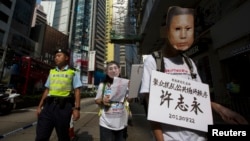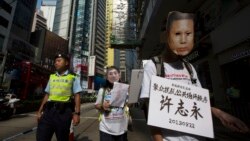The United States believes the Universal Periodic Review at the United Nations’ Human Rights Council has the potential to effect real change in countries throughout the world; because the Universal Periodic Review, or UPR, is not just a review that occurs in Geneva every four years, but is an ongoing mechanism to advance human rights around the world.
The United States’ interventions (comments on respect for human rights) to other countries are carefully crafted with the goal of providing useful, targeted recommendations that, when implemented, will create positive change for society.
The 17th Universal Periodic Review occurred from Monday, October 21 – November 1, 2013 in Geneva, Switzerland. The United States participated in the UPR of China October 22 along with the international community. Uzra Zeya, the Acting Assistant Secretary for Democracy, Human Rights, and Labor, delivered the U.S. statement at the China UPR.
Acting Assistant Secretary Zeya said that “We recommend China end the use of harassment, detention, arrest, and extralegal measures such as enforced disappearance to control and silence human rights activists as well as their family members and friends.
“[We also recommend China] protect the rights of ethnic minority groups, including Tibetans, Uighurs, and Mongolians, in accordance with China’s Constitution and international human rights commitments.
“[Finally, we recommend China] reform its administrative justice system, including by eliminating ‘reeducation through labor,’ and ratify the International Covenant on Civil and Political Rights.”
"We are concerned that China suppresses freedoms of assembly, association, religion, and expression, including on the Internet,” Acting Assistant Secretary Zeya said in conclusion.
“[We are concerned that China] harasses, detains, and punishes activists, including Xu Zhiyong and Yang Maodong, targets rights defenders’ family members and friends; and implements policies that undermine the human rights of ethnic minorities.”
The United States’ interventions (comments on respect for human rights) to other countries are carefully crafted with the goal of providing useful, targeted recommendations that, when implemented, will create positive change for society.
The 17th Universal Periodic Review occurred from Monday, October 21 – November 1, 2013 in Geneva, Switzerland. The United States participated in the UPR of China October 22 along with the international community. Uzra Zeya, the Acting Assistant Secretary for Democracy, Human Rights, and Labor, delivered the U.S. statement at the China UPR.
Acting Assistant Secretary Zeya said that “We recommend China end the use of harassment, detention, arrest, and extralegal measures such as enforced disappearance to control and silence human rights activists as well as their family members and friends.
“[We also recommend China] protect the rights of ethnic minority groups, including Tibetans, Uighurs, and Mongolians, in accordance with China’s Constitution and international human rights commitments.
“[Finally, we recommend China] reform its administrative justice system, including by eliminating ‘reeducation through labor,’ and ratify the International Covenant on Civil and Political Rights.”
We are concerned that China suppresses freedoms of assembly, association, religion, and expression, including on the Internet."
"We are concerned that China suppresses freedoms of assembly, association, religion, and expression, including on the Internet,” Acting Assistant Secretary Zeya said in conclusion.
“[We are concerned that China] harasses, detains, and punishes activists, including Xu Zhiyong and Yang Maodong, targets rights defenders’ family members and friends; and implements policies that undermine the human rights of ethnic minorities.”






